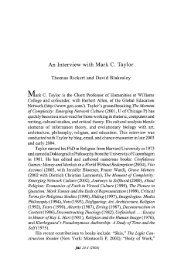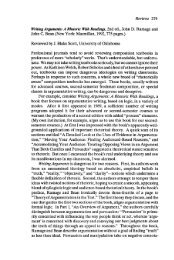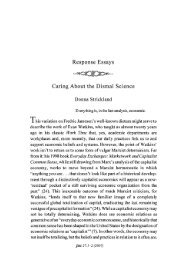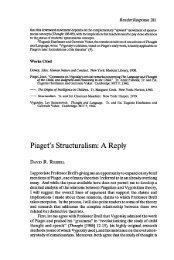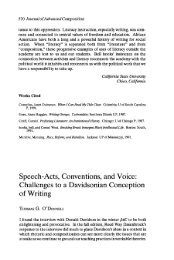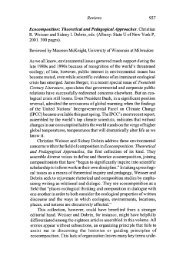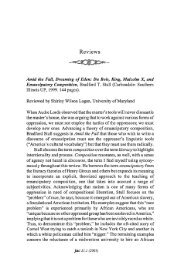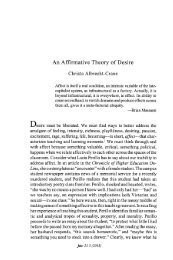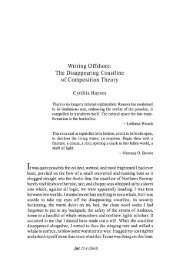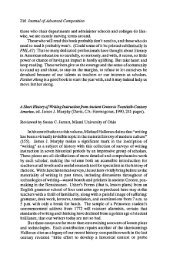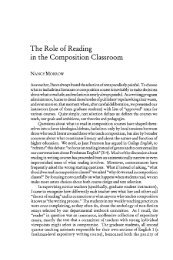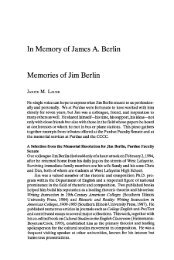Politics, Pedagogy, and the Profession of Composition ... - JAC Online
Politics, Pedagogy, and the Profession of Composition ... - JAC Online
Politics, Pedagogy, and the Profession of Composition ... - JAC Online
You also want an ePaper? Increase the reach of your titles
YUMPU automatically turns print PDFs into web optimized ePapers that Google loves.
Bruce Horner 133<br />
to classify discrete forms that power takes distracts from <strong>the</strong> interrelated<br />
aspect <strong>of</strong> certain elements (e.g., persuasion <strong>and</strong> manipulation) ... <strong>and</strong><br />
from <strong>the</strong> systemic nature <strong>of</strong> power in society as a continuous 'web' <strong>of</strong><br />
relationships that catches up persons in a series <strong>of</strong> effects which are only<br />
partly intended" (96). We can see <strong>the</strong>se limitations operating in Bizzell's<br />
formulations. These formulations treat power as an entity that individuals<br />
possess <strong>and</strong> exercise (for example, A exercising power over B, with or<br />
without B's consent), overlook <strong>the</strong> politics <strong>of</strong> categorizing power, <strong>and</strong><br />
assume a degree <strong>of</strong> autonomy among <strong>the</strong> parties involved in such<br />
exercises at odds with <strong>the</strong> Althusserian view <strong>of</strong> power <strong>and</strong> ideology that<br />
o<strong>the</strong>rwise informs her arguments.<br />
As an alternative to such approaches, Burbules draws on Anthony<br />
Giddens to argue for a view <strong>of</strong> power as relational (Burbules 97). Such a<br />
conception emphasizes <strong>the</strong> circumstances under which specific parties<br />
come toge<strong>the</strong>r <strong>and</strong> thus avoids <strong>the</strong> rationalist view <strong>of</strong><strong>the</strong> exercise <strong>of</strong> power<br />
<strong>and</strong> <strong>the</strong> expectation <strong>of</strong> fixed outcomes from that exercise. A complex <strong>of</strong><br />
material circumstances-as much as any uniform conscious intentiondetermine<br />
or, ra<strong>the</strong>r, overdetermine, power relations <strong>and</strong> <strong>the</strong> effects <strong>of</strong><br />
<strong>the</strong>ir operation. Fur<strong>the</strong>rmore, a view <strong>of</strong> power as relational undermines<br />
<strong>the</strong> reification <strong>of</strong> power, <strong>and</strong> types <strong>of</strong> power, as always <strong>and</strong> everywhere<br />
<strong>the</strong> same entity. Ra<strong>the</strong>r than differentiating power in terms <strong>of</strong> <strong>the</strong> consent<br />
<strong>of</strong> those on whom it is exercised, power is differentiated according to <strong>the</strong><br />
specifics <strong>of</strong> those circumstances. And finally, this view recognizes a<br />
degree <strong>of</strong> power in all parties ra<strong>the</strong>r than injust one. As Giddens observes,<br />
Power relations ... are always two-way, even if <strong>the</strong> power <strong>of</strong> one actor<br />
or party in a social relation is minimal compared to ano<strong>the</strong>r. Power<br />
relations are relations <strong>of</strong> autonomy <strong>and</strong> dependence, but even <strong>the</strong> most<br />
autonomous agent is in some degree dependent, <strong>and</strong> <strong>the</strong> most dependent<br />
actor or party in a relationship retains some autonomy. (93)<br />
Applying this view <strong>of</strong> power to Ellsworth's example, we might say<br />
that her students' resistance to her efforts at achieving a "critical"<br />
pedagogical ideal represents nei<strong>the</strong>r evidence <strong>of</strong> <strong>the</strong> failure <strong>of</strong> that<br />
pedagogy nor her failure to assume authority but students' own exercise<br />
<strong>of</strong> power in relation to Ellsworth. Thus, it was not something that had to<br />
interfere with <strong>the</strong> course but evidence <strong>of</strong> <strong>the</strong> potential <strong>the</strong>y brought to bear<br />
on <strong>the</strong> course. From this perspective, too, Ellsworth's complaint-that<br />
"<strong>the</strong>re have been no sustained research attempts to explore whe<strong>the</strong>r or<br />
how <strong>the</strong> practices it [critical pedagogy] prescribes actually alter specific<br />
power relations outside or inside schools"-is robbed <strong>of</strong> its force,



